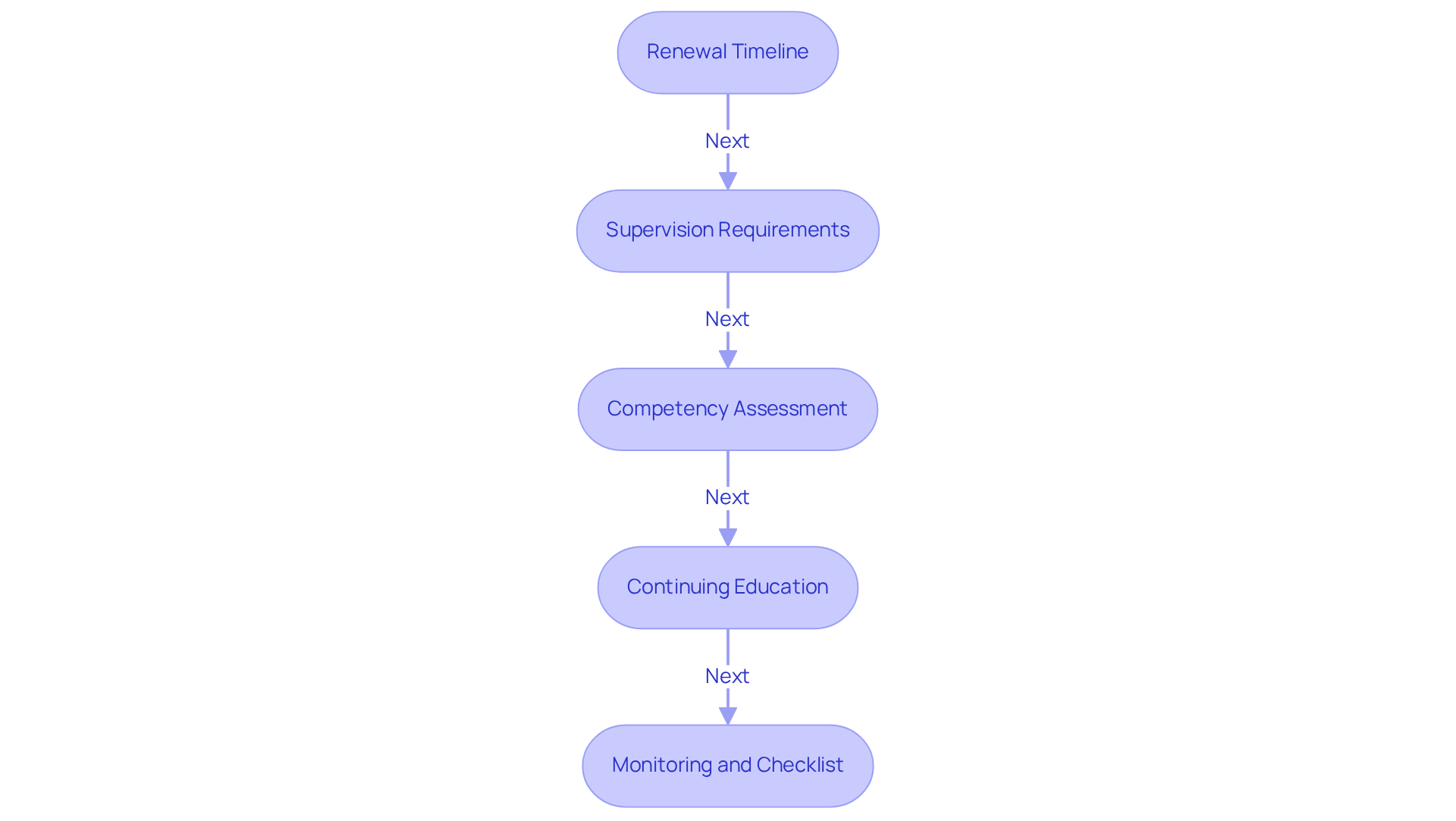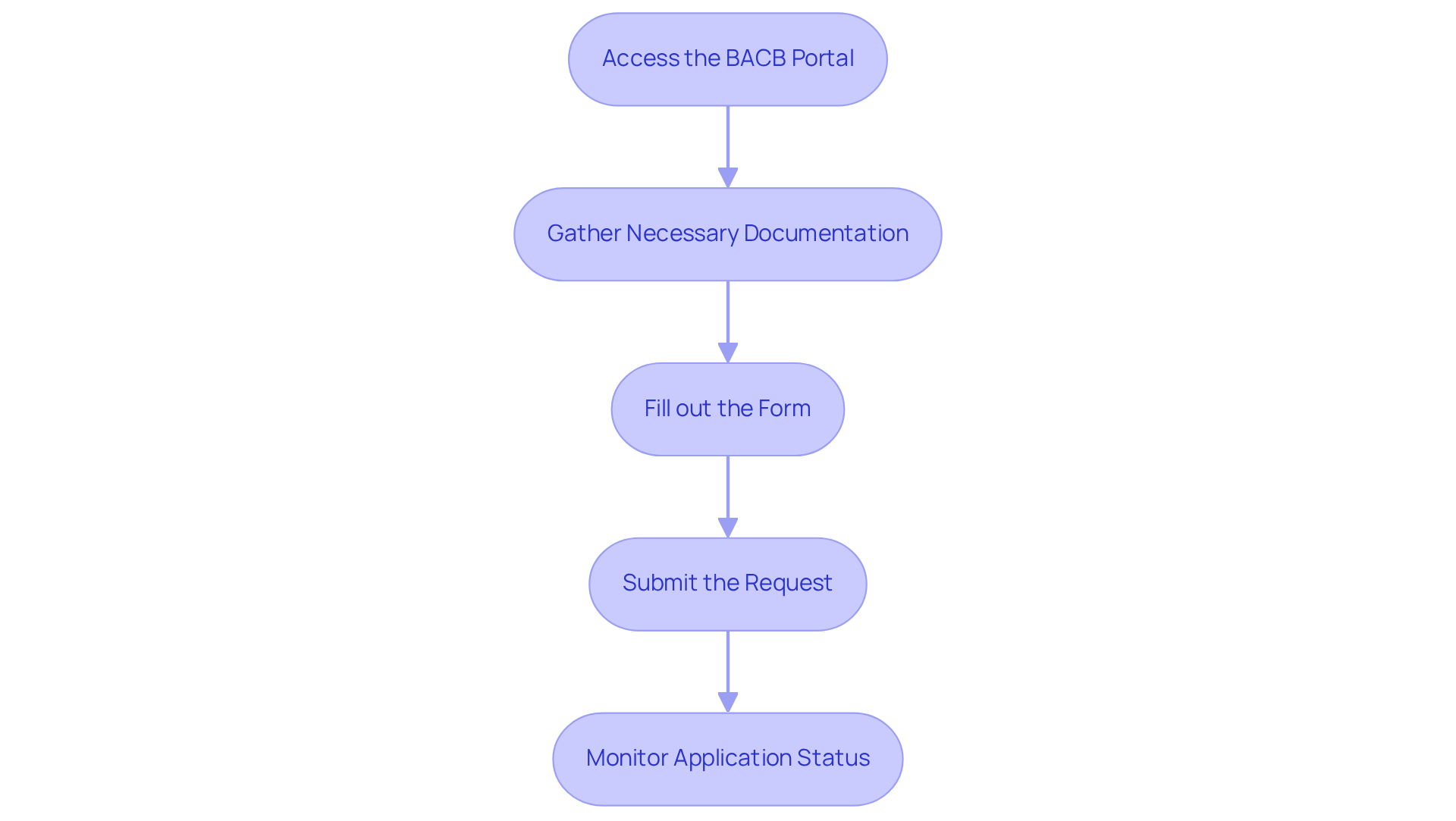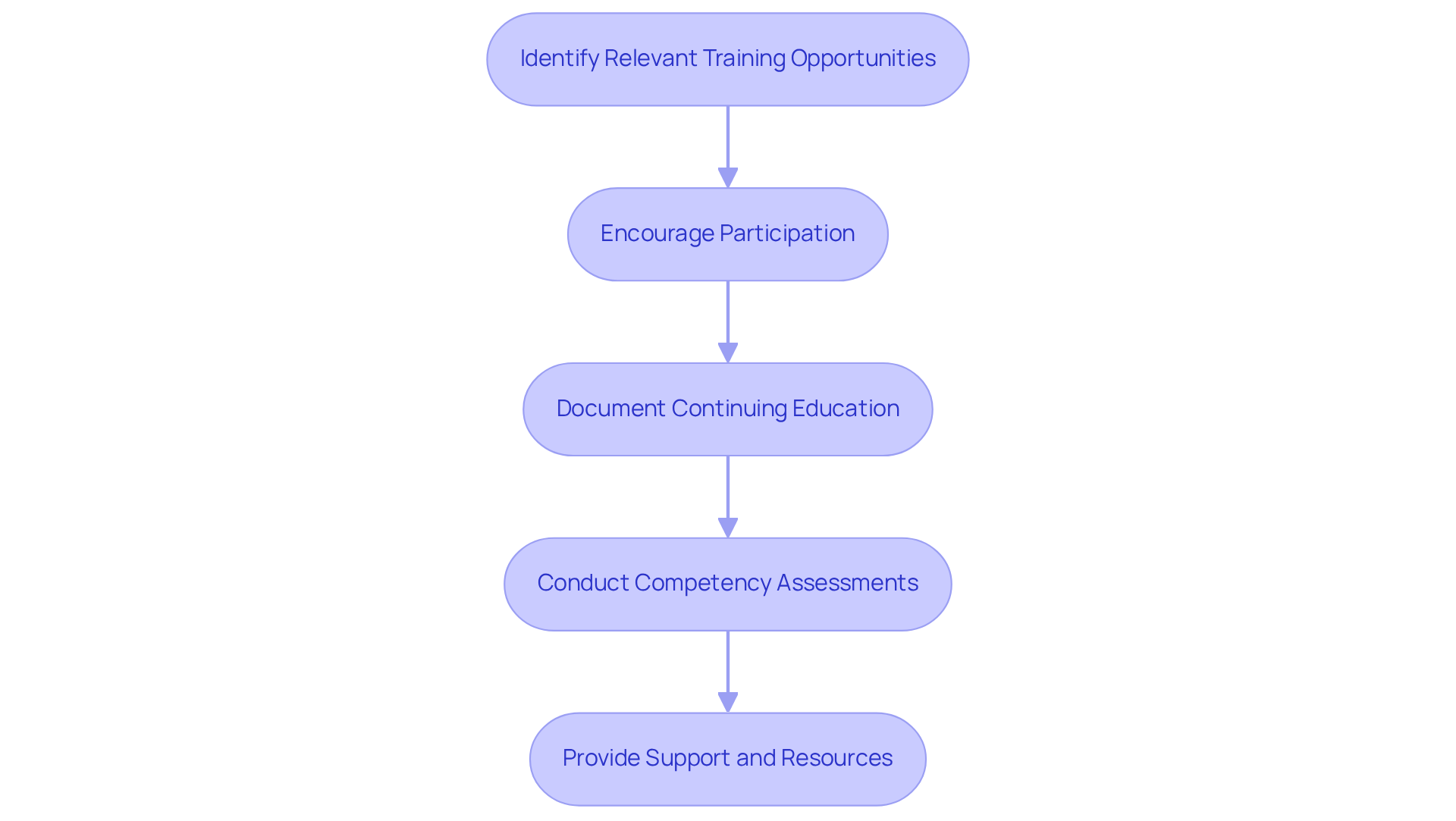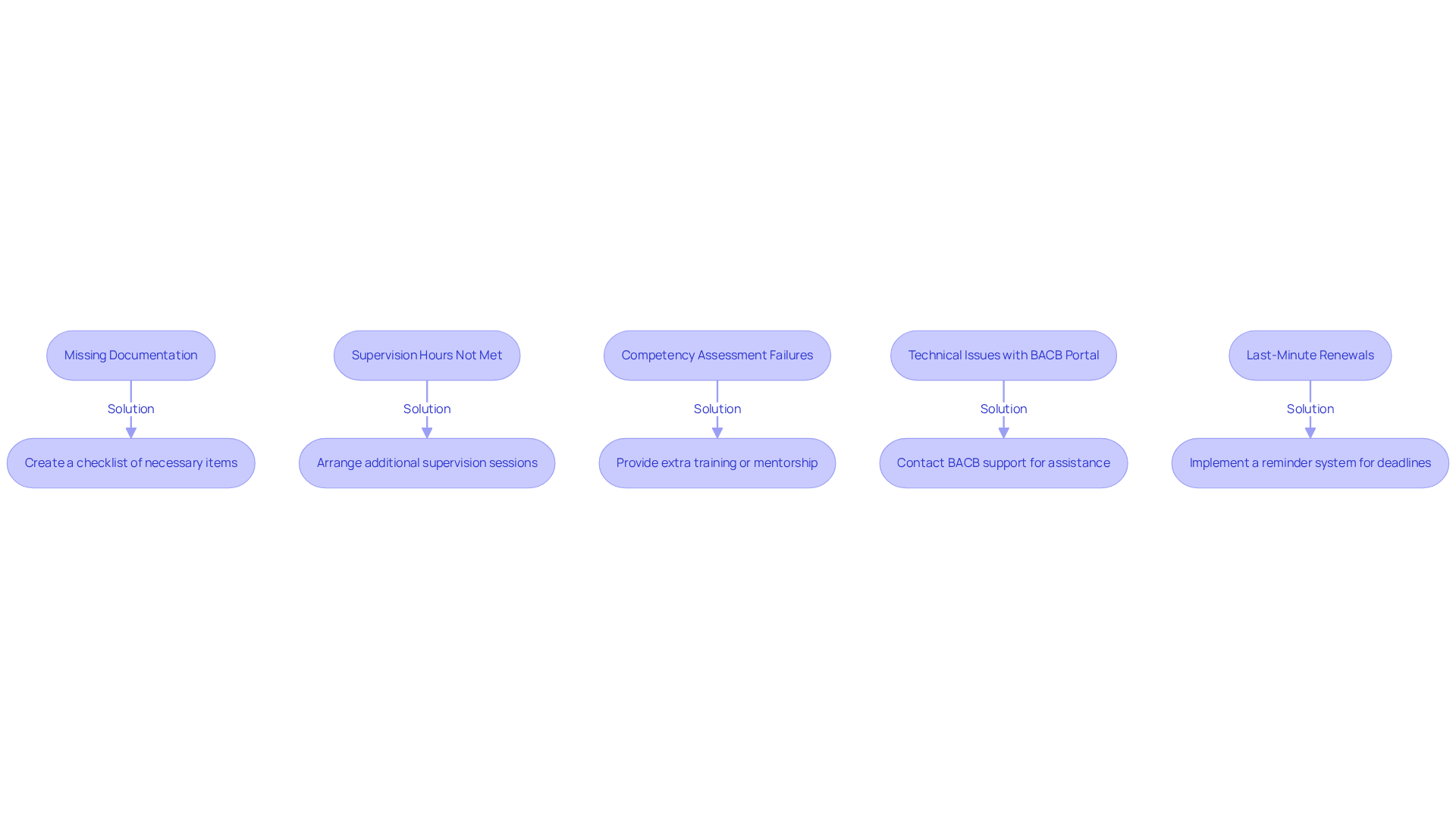September 29, 2025

The article serves as an authoritative step-by-step guide for employers, detailing how to effectively support Registered Behavior Technicians (RBTs) in the competency renewal process.
Understanding renewal requirements is crucial; it not only ensures that RBTs maintain their credentials but also aligns with industry standards.
Additionally, facilitating continuing education is vital, as it helps RBTs stay informed about the latest practices and methodologies.
Employers may encounter common challenges during this process, and troubleshooting these issues is essential for compliance and success.
By addressing these key areas, employers can significantly enhance the competency renewal experience for RBTs, ultimately benefiting their organizations and the clients they serve.
Navigating the complexities of RBT competency renewal is a daunting task for employers, especially as the demand for Registered Behavior Technicians continues to surge. The need for skilled RBTs is not just a trend; it’s a necessity in providing high-quality care. Understanding the specific requirements set by the Behavior Analyst Certification Board (BACB) is crucial for ensuring that RBTs maintain their credentials.
However, organizations face various challenges, including:
How can you streamline this process to avoid pitfalls and foster a skilled workforce? This guide offers a step-by-step approach to mastering RBT competency renewal, equipping employers with the tools needed to support their technicians effectively. By addressing these challenges head-on, you can ensure that your RBTs are not only compliant but also excel in their roles.
To effectively pursue RBT competency renewal, employers must understand the specific requirements established by the Behavior Analyst Certification Board (BACB). Key components include:
Renewal Timeline: Registered Behavior Technicians must renew their certification each year. Employers should proactively monitor the expiration dates of their registered behavior technicians' certifications to ensure timely RBT competency renewal. Missing the 30-day grace period post-expiration necessitates a new application, complicating the process and potentially stalling career progression.
Supervision Requirements: Ongoing supervision is crucial for registered behavior technicians, who must receive a total of 5 supervision hours, with at least 3 hours from a qualified BCBA. Employers should ensure that their registered behavior technicians are receiving the mandated supervision necessary for RBT competency renewal to enhance their skills and maintain compliance with BACB standards. As noted by Yellow Bus ABA, 'Supervision assists registered behavior technicians in navigating their professional practice effectively, ensuring they apply best practices and adhere to professional guidelines.'
Competency Assessment: Registered Behavior Technicians must demonstrate their competency in essential skills related to ABA therapy. Employers should be ready to support these evaluations, which are an essential component of the RBT competency renewal process. Regular monitoring of the BACB account and email notifications can help address any requests for additional information promptly, reducing delays.
Continuing Education: Registered Behavior Technicians must fulfill a minimum of 20 Continuing Education Units (CEUs) during the recertification period, with at least 10 CEUs pertaining to ABA. Employers should encourage their RBTs to engage in relevant training and workshops for RBT competency renewal, ensuring they remain competent and effective in their roles.
Monitoring and Checklist: Employers should highlight the importance of tracking the BACB account and email alerts for updates on the status of the reauthorization process. Using a detailed checklist can simplify the RBT competency renewal process and avoid delays, ensuring all required steps are completed.
By thoroughly grasping these requirements, organizations can better assist their registered behavior technicians in maintaining their credentials and ensuring compliance with industry standards, ultimately fostering a more skilled and reliable workforce.

Once Registered Behavior Technicians have fulfilled the requirements for reauthorization, employers play a crucial role in supporting them through the completion of the reauthorization process. Here’s how:
By adhering to these steps, organizations can effectively support their Registered Behavior Technicians in successfully completing the application process.

To ensure RBTs fulfill their continuing education and competency assessment obligations, employers must implement the following strategies:
Identify Relevant Training Opportunities: Research and provide information on workshops, webinars, and courses that align with the BACB’s continuing education requirements. Registered Behavior Technicians are required to accumulate 20 Continuing Education Units (CEUs) for certification renewal, with at least 10 related to applied behavior analysis. This guarantees access to high-quality educational resources for registered behavior technicians.
Encourage Participation: Actively promote participation in these educational opportunities, emphasizing the critical role of ongoing learning in maintaining best practices in ABA therapy. As Dr. Jaime Flowers states, "Continuing education is essential for maintaining your certification, staying current with best practices, and advancing your career."
Document Continuing Education: Maintain comprehensive records of RBTs’ completed continuing education activities. This documentation is crucial for application submissions and assists in preventing delays in the certification process. Emphasizing the necessity of accurate documentation can prevent complications during renewal.
Conduct Competency Assessments: Facilitate regular competency evaluations to assess the skills of registered behavior technicians and ensure they meet the required standards. This can include direct observation and structured feedback sessions, which are vital for professional growth.
Provide Support and Resources: Offer resources such as study materials and access to mentorship programs to assist registered behavior technicians in preparing for assessments and enhancing their skills. This support fosters a culture of continuous improvement.
By meeting these responsibilities, companies not only support registered behavior technicians in the RBT competency renewal process but also enhance the overall quality of care offered in ABA therapy. Additionally, understanding the 30-day grace period for late submissions can help employers manage timelines effectively. With the anticipated rise in demand for BCBAs and registered behavior technicians, investing in their development is essential for organizational success.

Employers may face various challenges during the RBT competency renewal process, particularly as the demand for Registered Behavior Technicians is expected to rise significantly. Here are some common issues and effective troubleshooting strategies:
Missing Documentation: If registered behavior technicians lack required documents, supervisors should create a checklist of necessary items to ensure all paperwork is collected before submission. This proactive approach can help reduce the 23% of RBT application submissions that encounter delays due to incomplete documentation.
Supervision Hours Not Met: Should Registered Behavior Technicians fail to complete their supervision hours, supervisors must arrange additional sessions to meet this requirement before the renewal deadline. With the field of behavior analysis projected to expand by 22% by 2028, ensuring compliance is crucial to addressing the rising demand for registered behavior technicians.
Competency Assessment Failures: In cases where Registered Behavior Technicians struggle with competency evaluations, supervisors should provide extra training or mentorship to enhance their skills. This investment can significantly boost RBT performance and confidence.
Technical Issues with the BACB Portal: If registered behavior technicians encounter technical difficulties while submitting their applications, supervisors should encourage them to contact BACB support for assistance and explore alternative submission methods if necessary.
Last-Minute Renewals: To avoid last-minute rushes, organizations should implement a reminder system to alert registered behavior technicians of upcoming deadlines well in advance. The typical reapplication fee for RBT certification is $50, which should be factored into budgeting considerations.
Furthermore, registered behavior technicians are required to complete 20 hours of ongoing education during each RBT competency renewal period—an essential element of the recertification process that organizations need to recognize.
By proactively addressing these challenges, employers can facilitate a smoother RBT competency renewal process for their RBTs, which ensures compliance and continuity of care.

Understanding and navigating the RBT competency renewal process is essential for both Registered Behavior Technicians and their employers. Ensuring compliance with the requirements set by the Behavior Analyst Certification Board (BACB) not only supports the professional development of RBTs but also enhances the quality of care provided in Applied Behavior Analysis (ABA) therapy. Recognizing the importance of timely renewals, adequate supervision, competency assessments, and continuing education allows organizations to foster a skilled and reliable workforce.
Key insights from the article highlight the critical steps involved in the RBT renewal process. Employers are encouraged to:
Adopting proactive strategies can significantly streamline the renewal experience for Registered Behavior Technicians, ultimately ensuring compliance and continuity of care.
In light of the anticipated growth in demand for Registered Behavior Technicians, it is crucial for employers to invest in their development and support their ongoing education. By facilitating access to training opportunities and providing resources for competency assessments, organizations can not only meet the renewal criteria but also contribute to the professional advancement of their staff. Embracing these practices ensures that RBTs remain competent and effective in their roles, leading to improved outcomes in the field of ABA therapy.
What is the renewal timeline for Registered Behavior Technicians (RBTs)?
RBTs must renew their certification each year. Employers should monitor expiration dates to ensure timely renewal, as missing the 30-day grace period after expiration requires a new application.
What are the supervision requirements for RBT competency renewal?
RBTs must receive a total of 5 supervision hours, with at least 3 hours from a qualified BCBA. Employers should ensure their RBTs are receiving the necessary supervision to maintain compliance with BACB standards.
What is involved in the competency assessment for RBTs?
RBTs must demonstrate their competency in essential skills related to ABA therapy. Employers should support these evaluations and monitor BACB accounts and email notifications to address requests for additional information promptly.
How many Continuing Education Units (CEUs) do RBTs need for recertification?
RBTs must complete a minimum of 20 CEUs during the recertification period, with at least 10 CEUs focused on ABA. Employers should encourage their RBTs to participate in relevant training and workshops.
What strategies can employers use to facilitate the RBT competency renewal process?
Employers should track BACB accounts and email alerts for updates on the reauthorization process. Using a detailed checklist can help ensure all required steps are completed and avoid delays.
Why is understanding RBT renewal requirements important for employers?
By understanding these requirements, organizations can assist their RBTs in maintaining their credentials and ensuring compliance with industry standards, ultimately fostering a more skilled and reliable workforce.
Our expert recruitment strategies and AI-driven sourcing ensure that you receive top-notch candidates quickly, without compromising on quality. Whether you’re looking for BCBAs, Clinical Directors, or RBTs, we’ve got you covered.